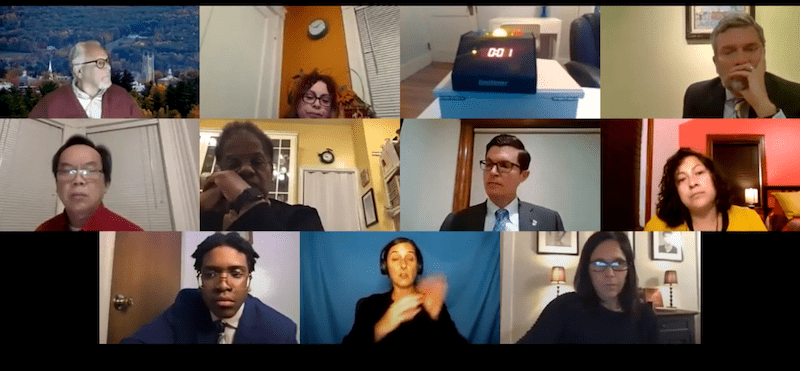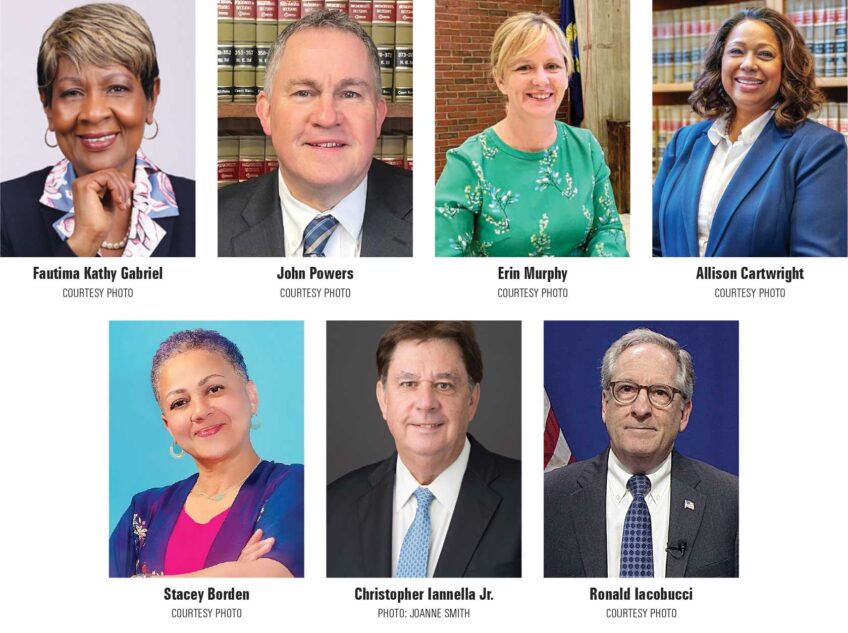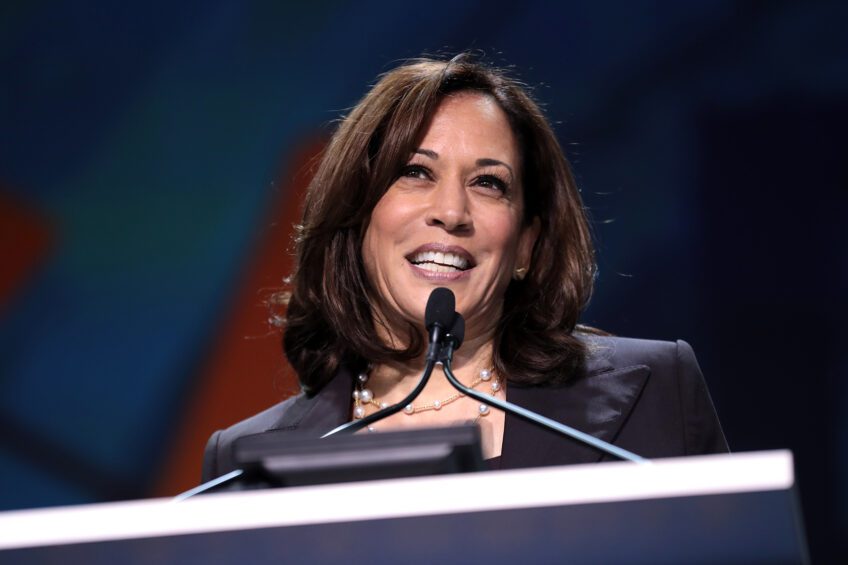
A brew of conflict fueled by Boston’s racial politics came to a boil last week, when the School Committee took up a proposal to suspend for one year the test governing entrance to the city’s three exam schools.
A flashpoint came when now-former Boston School Committee President Michael Loconto was heard on hot mic making fun of people’s names after secretary Elizabeth Sullivan read off the names of several Asian Americans who were scheduled to testify.
“That was like Shenea, Shenia, Shaneyney and Boo Boo and David,” he said during the Wednesday night meeting, which was held on Zoom and recorded.
By the end of the meeting Loconto apologized, and by noon Thursday he resigned after facing a barrage of condemnation from parents and local elected officials.
While Loconto’s offense generated headlines across the nation, the School Committee’s foray into exam school politics — long a third rail in Boston — surfaced long-simmering racial tensions in the city.
In years past, the conflict has pitted white parents against black parents. But in last week’s conflict, some say, white parents enrolled Asian families as proxies, whipping up fear among Chinatown families with misinformation about the proposed change to admissions policies.
“I am angry by the way white families are literally and figuratively pushing Asian families to the front,” testified Charlestown High School teacher Sung-Joon Pai during the meeting. “It is an ugly continuation of the way the ‘model minority’ myth has been used to wedge Asian Americans as a human shield in the fight for equity.”
White families from West Roxbury have long had a reputation for fierce advocacy around access to Boston Latin School (BLS), as well as high voter turnout and political engagement. Yet Mayor Martin Walsh and the School Committee took a rare stand against the perceived interests of that neighborhood’s residents by agreeing to a one-year suspension of the entrance test, which normally accounts for 50% of the criteria for admission to the city’s exam high schools.
Of the three exam schools, BLS is the one most coveted by white parents. Whites make up just 15% of the BPS student body but 45% of the 2,471 students at BLS. They make up 30% of the students at Boston Latin Academy and 12% at the O’Bryant School of Math and Science.
West Roxbury families have long relied on expensive tutors, Advanced Work Programs offered in their local BPS schools and a network of private schools many see as feeders to Boston Latin School, one of which distributed A+ averages to more than two-thirds of its students, who made up 10% of the next year’s incoming class at BLS.
Hyde Park resident Jessica Madden Fuoco, an instruction coach at English High School, criticized the privilege enjoyed by West Roxbury families whom she said are overrepresented at BLS.
“They are worried about losing their advantage,” Fuoco said. “An advantage at the expense of children of color in BPS. An advantage that they have enjoyed for so long that they view it as an entitlement and a right.”
Why the change?
The fervor of the white parents, many of whom were unaccustomed to the decidedly un-democratic workings of the appointed school committee, was not surprising, considering the unusual nature of the proposal School Committee members were prepared to approve.
In recent years, BPS superintendents Tommy Chang, Laura Perille and Brenda Cassellius all at one point suggested they were willing to change entrance requirements to Boston’s exam schools in order to promote more diversity, only to within days or hours hastily backtrack — an occurrence some observers have linked to the perceived political power of the West Roxbury parents.
In recent electoral cycles, however, the city’s political landscape has undergone profound changes. There are now just four white males on the 13-member City Council, down from eight in 2010. As the city’s electorate has changed, with greater numbers of Blacks, Latinos and Asians voting and fewer working-class, conservative-voting whites in the city than in past decades, the perceived power of the white West Roxbury families has declined.
While in 2013, a majority of the council supported scrapping the desegregation-era student assignment system in favor of a “home-based” system – which many in the Black community denounced as a return to unequal neighborhood schools – the current council has so far avoided the racially-polarized politics of past decades.
During the 2018 City Council election, the Coalition for Educational Equity polled candidates on whether they supported changing the entrance requirements for the city’s exam schools, Only three of the incumbents said no: at-large Councilors Annissa Essaibi-George and Michael Flaherty and District 6 Councilor Matt O’Malley, whose district includes West Roxbury. (District 3 Councilor Frank Baker and District 4 Councilor Andrea Campbell did not answer the survey.)
Next year, should Walsh run for reelection, he’ll face challenges from Michelle Wu, the top vote-getter in recent at-large council races and Campbell, both of whom so far are positioned to his left on issues from real estate development to police reform. Both challengers have Boston exam school experience: Campbell is a Black BLS graduate, and Wu, who is Taiwanese American, was guardian to a younger sister who attended BLS.
Until now, the leftward tilt in local politics hasn’t translated into substantive changes in exam school policy. And even now, because the School Committee’s vote for scrapping the entrance exam changes the policy for one year only, it’s not at all certain that there will be lasting change.
But the BLS parents and alumni who mobilized against the change over the last three weeks weren’t taking a chance on the change. They called and emailed the mayor and city councilors in an effort to pressure the School Committee, whose members are appointed by the mayor.
Toned-down rhetoric
During last Wednesday’s meeting, relatively few white parents testified in opposition. Among those who did, there was little of the divisive rhetoric that characterized conflicts over access to educational resources in past decades.
In that context, Loconto’s mocking Chinese and Black names became a focal point for the current conflict, an almost cathartic moment that enabled city councilors, parents and others to denounce racism, regardless of where they stood on the admission policy.
“It was a dog-and-pony show that detracted from the real issues,” said Katie Li, a member of the Massachusetts Asian American Educators Association (MAAEA). “[Loconto] is a product of a system the normalizes the dehumanization of people of color on a regular basis.”
Li says the BPS system has consistently shown disregard for Asian American families. She notes that while 50% of parents in BPS don’t speak English as their first language, School Committee meetings are held in English without translation. At last week’s meeting, Mandarin and Cantonese translators were on hand to translate testimony from Chinese American parents, many of whom understood nothing of what was said during the meeting.
However, information on the temporary change to the exam school entrance policy was not translated, leaving parents with limited understanding of English to receive news by word-of-mouth and information distributed by the West Roxbury parents.
“Parents didn’t understand that this is only for one year,” Li said.
MAAEA supports the change, Li said, but members have concerns about provisions of the plan that use the median income in a zip code to give more weight to low-income students in the admission process, given that neighborhoods such as Chinatown and the South End contain both high-income whites and low-income Chinese-American families in the same zip code.
“Seats for exam schools should really be for families that don’t have other options,” she said.
Just one Asian American was included in the Exam School Admissions Criteria Working Group, which came up with the recommendations for the one-year change in admissions policy.
Despite Loconto’s gaffe and the flare-ups of tribalism that were on display in last Wednesday’s meeting, the overall tenor of the evening was one of support for increased diversity at the exam schools.
“The way I look at the test is a bit different now,” said BLS junior Hieu Nguyen, who testified in favor of the change. “Not a lot of people look at everything that contributes to preparing students for the test. Not all students get the same preparation.”
NAACP Boston Branch President Tanisha Sullivan, who is a member of the working group, said the testimony she heard was mostly positive.
“I was actually very encouraged by what I heard Wednesday night,” she said. “History would have suggested that we were not going to hear of a lot of people stand up and support education justice. The city showed something different.”







